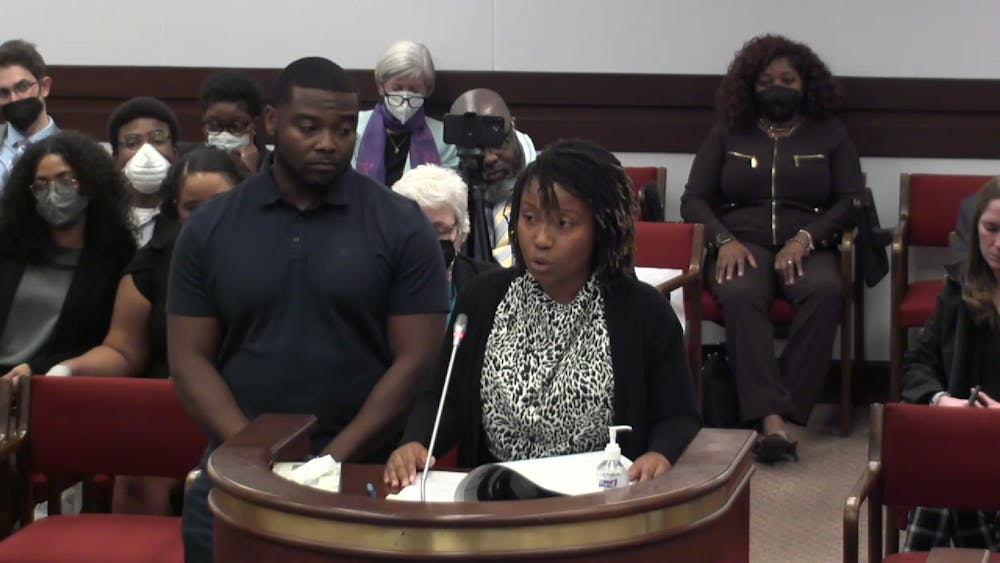The S.C. House of Representatives Education and Public Works (EPW) committee reconvened on Wednesday to hear testimony on five anti-critical race theory (CRT) bills, demonstrating the representatives’ prioritization of their future political campaigns over the S.C. education system.
South Carolina has one of the in the United States, leaving some educators feeling like the Palmetto State is in a race to the bottom.
One of those teachers is Kate Blanton, a Ph.D. candidate in the College of Education at �鶹С��ý and a former high school teacher in Ohio.
“When you talk about teachers in the southeast, we joke about it, but the race to the bottom between South Carolina and Mississippi, but that didn’t used to be on my radar," Blanton said. "People used to be like, 'Oh, I’m so sorry that you're in South Carolina.'”
S.C. education is a joke.
Many teachers and students are frustrated about S.C.’s quality of education. Some students said that it is embarrassing for high school seniors to apply to schools with an S.C. public education.
During testimony on Feb. 16, Kate Kuisel, a third-year history and philosophy student at �鶹С��ý, told the committee about the struggle of college admissions as a public-school student in Charleston.
“When applying for other colleges, my classmates and I had to work extra hard because admission programs around the country view a South Carolina education as lesser, and I had to work hard to distinguish myself,” Kuisel said.
There is nothing wrong with students having to work hard, but the legislation banning the EPW’s version of critical race theory can only make an already flawed education system worse.
Woody Holton, a history professor at �鶹С��ý, also gave testimony as a parent and an educator, lamenting the loss of discussion which would come from the banning of CRT.
“I teach at �鶹С��ý, and I assigned this book, The 1619 Project, in class this semester along with some of the critics … that produced the best discussion I have ever had in 20 years of teaching," Holton said. "They got both sides of the argument, not just the official state sanctioned version. They got a debate … please don't prohibit her [Holton's daughter] from participating in this debate.”
The EPW committee often mentions the , an initiative by the New York Times Magazine which aims to reorient the narrative of American history around slavery and the contributions of Black Americans.
, one of the bills debated by the EPW committee, would ban the 1619 Project from SC's public schools.
Similarly to their lack of understanding about CRT, none of the committee members seemed to know know much about this project.
When Holton asked the committee during his testimony which of their members had read the "The 1619 Project," Rep. Adam Morgan (R-Greenville) was the only one to raise his hand. When asked if he had read it in full, he put his hand down.
In his testimony, Holton demonstrated that resources, no matter how radical, are not able to indoctrinate students in themselves. Materials like The 1619 Project give a foundation for discussion which gives way to better students and better citizens — all things which S.C. superintendent of education Molly Spearman and the EPW committee supposedly want.
One parent even complained to Rep. Melissa Oremus (R-Aiken) about teachers using outside sources like , a series of animated educational videos for children, as she responded to Spearman’s testimony.
“[BrainPOP] has a sometimes left-leaning agenda about how to feel or things like that. I think the purpose of this is to basically get back to us given the standards that needs to be without the feelings and emotion into it," Oremus said.
Oremus did not give examples of BrainPOP’s left-leaning agenda nor other resources with feelings and emotion in them used by teachers.
These complaints are from parents represented by Oremus and other Republicans vying for re-election and advancing their political careers.
Oremus and other representatives want to continue their political career, which should dishearten parents concerned about their child’s education, because these representatives clearly could not care less about teachers if they can get re-elected.
Oremus did not respond to �鶹С��ý's requests for comment earlier this week.
The banning of “CRT” is not unique to S.C. politics.
, showing that it has become popular for politicians to take a stand against the so-called indoctrination of American children.
Anti-CRT legislation is a plight across the country, and in the future might get politicians re-elected, so when a legislator doesn't know what CRT is, or when he interrupts testimony to get grilled by a former judge about his poor legislation, it’s okay: legislators don’t have to legislate well to stay in office.
In fact, they don't even have to write their own legislation.
Bills like H.4799 do not originate form S.C. legislators but from right-wing think tanks. The legislation's language and definitions are copied verbatim from and and presented to S.C.'s state legislature.
They're bad bills for S.C. because they weren't written by or for South Carolinians. They were written by think tanks popular among Republicans across the United States.
Representatives like Oremus won’t have to make sense or talk to educators about education bills for one simple reason: it doesn’t benefit their careers to do so, even if that career is at the detriment of S.C. education.

